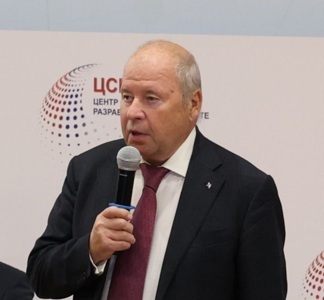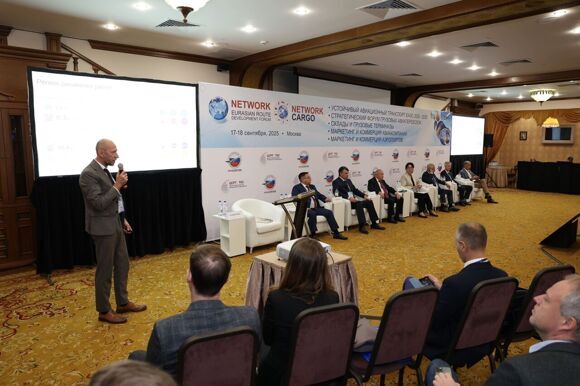
|
AVIACENTER NEWS
28.10.2025
October 28, 2025, marked a significant event for aviation industry experts: the second import-substituting model of the Russian MS-21 aircraft took to the skies from the Irkutsk airfield of the Yakovlev Aviation Plant. 20.10.2025
Anton Koren, General Director of the Center for Strategic Research of the Civil Aviation (AVIACENTER) and Head of the Transport Strategy Center (TSC), spoke live on RBC about the trade war between China and the United States, in light of the planned US imposition of an additional 100% tariff on Chinese goods. 03.10.2025
The Federation Council held a roundtable discussion on the use of UAS for recording offenses and monitoring traffic compliance. 17.09.2025
On September 17, 2025, the international conference "Sustainable Aviation Transport of the EAEU 2026–2035" was held in Moscow. It was dedicated to the implementation of the UN Initiative for the Decade of Sustainable Transport 2026–2035. 27.08.2025
On October 23, 2025, Moscow will host a key meeting of professionals in the field of design, construction and operation of passenger terminals and airports: VI Eurasian International Forum Passenger Terminals - 2025, XIV Eurasian International Forum Design, Construction and Operation of Airports - 2025. |
AVIACENTER NEWSMain
« Back
The Future of Aviation Transport in the Eurasian Economic Union: Results of the International Conference Organized by the UN Economic Commission for Europe, the Eurasian Economic Commission, and the TSC 17.09.2025 00:00
Conference Presidium: from left to right – Alexander Zaboev, Eurasian Development Bank; Vladimir Chereuhin, Minsk International Airport; Anton Koren, Transport strategy center (TSC); Oleg Dunayev, United Nations Association of Russia; Dinara Sharipova, Eurasian Economic Commission; Andrey Khvostunkov, ICAO Airport Economics Expert Group; Evgeny Smirnov, UTair Airlines. On September 17, 2025, the international conference "Sustainable Aviation Transport of the EAEU 2026–2035" was held in Moscow. The conference was dedicated to the implementation of the UN Initiative for the Decade of Sustainable Transport 2026–2035. The conference "Sustainable Aviation Transport of the EAEU 2026–2035," organized by the Expert Center for Sustainable Mobility in Transport of the United Nations Association of Russia with the support and participation of the Eurasian Economic Commission and the Transport strategy center (TSC), became the central plenary event of the annual Eurasian Aviation Forum NETWORK - 2025. Along with participants from EAEU countries, the conference was attended by invitation by representatives of national governments, embassies from Asia, the Middle East, Africa, Central and South America, and other regions, regional governments, key airlines, airports, and airport holding companies, developers of innovative solutions for airlines and airports, key international associations, and the media.
"Today, we face challenges where sustainable air transport is becoming a necessity. The formation of a common market for air transport services in the Eurasian region will not only improve the accessibility of air travel for citizens but will also become a key factor in economic growth and the integration of EAEU countries. I am confident that cooperation and exchange of experience in this area will enable the aviation industry to transition to sustainable development principles. The goal of our cooperation is to ensure a future in which aviation is not only highly developed but also safe and environmentally friendly," the minister emphasized.
Oleg Dunaev, UN Association of Russia The conference continued with a presentation by Oleg Dunaev, Director of the UN Association of Russia's Expertise Center for Sustainable Mobility in Transport. Oleg Dunaev's presentation focused on developing international air transport connectivity and delivering value to customers through the transformation of air transport services and company partner networks. "The next decade will be marked by uncertainty, with choices being made between globalization, regionalization, and restrictions on air transport in global markets," said Oleg Dunaev. "The key issue today is ensuring the sustainability of companies' business models for the mobility of people and goods. It is necessary not only to manage supply chains but also to develop financial and logistics services, optimize our customers' costs, and achieve profit and revenue growth for our companies, leadership in air transport markets, and the development of human capital." Oleg Dunaev emphasized that sustainable transport is a cross-sectoral accelerator and a tool for addressing socioeconomic challenges, which is linked to the well-being of the EAEU countries and the region as a whole.
Anton Koren, Transport strategy center (TSC) According to Anton Koren, General Director of the Transport strategy center (TSC), the main factor that will influence the industry's development is the transition from globalization to regionalization. "Regionalization has already occurred and will intensify. Many major airlines, airports, and their alliances are responding to global geopolitical changes. Regional network alliances determine future development; they form the basis for major international air transport hubs and global growth centers. This is how Middle Eastern and South Asian hubs are being created, which will shape future global changes in aviation. Competition among major regional airlines and airports will intensify. The sustainability of regional alliances will be achieved through technological sovereignty and the creation of production facilities, which in aviation primarily include aircraft," concluded Anton Koren. The speaker is confident that Russia and China will soon set the tone for competition in the global aviation manufacturing market, with Russia several years ahead of its partners thanks to the timely development of fully import-substituting aircraft, rather than relying on just a few components, thanks to and despite sanctions. "All the key fundamental tasks for the sustainable development of national ground infrastructure—airports—in Russia have been achieved. Therefore, in the near future, after the start of serial production of aircraft in all segments, Russia will achieve complete independence." Anton Koren emphasized that the aviation markets of all EAEU countries are showing positive development trends. All macroeconomic factors contribute to further long-term growth. Some note a decline in the air travel market in Russia, but this is often incorrect. The Russian aviation market has also been growing in recent years and will continue to do so in 2025-2026, if the aviation market is considered in terms of the sum of domestic and international flights by Russian airlines and international flights by foreign airlines. If Russian airlines' traffic declines, this is offset by new traffic volumes from foreign airlines. Overall, market growth is positive. According to the Transport strategy center (TSC), growth rates will be high after the end of the Cold War, the lifting of sanctions, and the resolution of the aircraft fleet supply issue. Anton Koren also illustrated the connection between the loss of sovereignty in airline and airport investments and the state's loss of control over the development of integration with neighboring friendly countries through foreign investors' control over the diversion of passenger and cargo flows, including to the regions and airports where investments originate.
Dinara Sharipova, Eurasian Economic Commission There are good prospects for sustainable development of transport infrastructure not only in Russia but also in the EAEU as a whole. Dinara Sharipova, Head of the Water and Air Transport Division of the Department of Transport and Infrastructure of the Eurasian Economic Commission, stated that the union is "studying the work of Russian scientists on how the Sustainable Development Goals (SDGs) are being implemented by Russian airlines" and stated that "the members of the Eurasian Union are maintaining a high pace of development of national transport infrastructure and the infrastructure of Eurasian transport corridors, which is fully consistent with the main priority of the EAEU's transport policy." The union's new transport policy began to be implemented in 2023, and in 2026, a 10-year period dedicated to sustainable development and the implementation of its three main factors: economics, ecology, and social development will begin. Sustainable development, in turn, will accelerate the integration process of the union's members. "There is a need for a more systematic approach, which should be enshrined in EAEU documents dedicated to the sustainable development of the aviation industry, including in strategic planning. One method for achieving sustainable development could be increasing the parties' engagement in innovation and investment," Dinara Sharipova emphasized. Proposals under consideration that would consolidate the five countries' efforts to deepen EAEU integration include the creation of an association, a single airline, or an operator. However, common standards for the air travel market are at the top of the agenda.
Alexander Zaboev, Eurasian Development Bank Alexander Zaboev, Head of the Center for Integration Studies at the Eurasian Development Bank: "I am confident that the sustainable development of civil aviation in the EAEU will be based on the unwavering adherence to ICAO standards and recommended practices." He noted: "Many regions of the world are developing their own paths, their own conditions for market access and the establishment of new alliances, but, one way or another, civil aviation will remain a global mode of transport." According to Alexander Zaboev, the EAEU transportation market is growing, and he cited the following reasons for this growth: "Firstly, the economies of Central Asian countries are growing, as are per capita incomes, and, consequently, human mobility is increasing. Between 2020 and 2024, it more than tripled. Secondly, investment is flowing into the region. Over the past three years, investment from the Persian Gulf countries into the air transport sector of Central Asia has amounted to approximately $3 billion." The total cost of airport and airfield infrastructure development projects in Central Asian countries is $8 billion, a relatively small sum for such projects. Andrey Khvostunkov, a member of the ICAO Airport Economics Panel, outlined the key issues to be discussed at the international organization in his report "Sustainable Development of the Aviation Industry: Key Issues on the Agenda of the 42nd Session of the ICAO Assembly": "The focus will be on barriers to sustainable development, such as limited liberalization in certain air transport sectors, differentiated and distorting taxes, high concession fees for airport infrastructure, and burdensome entry and visa barriers." Resolving these issues will contribute to the sustainable development goals and sustainability of aviation enterprises. Andrey Khvostunkov emphasized that air transport makes a significant contribution to global economic growth and social development: it creates jobs, develops trade and tourism, and ensures overall development. Therefore, states must make aviation a national priority. The speaker stated that a structure could be created within ICAO to monitor the operational characteristics, economic efficiency, and safety of the industry, given its understanding of its importance.
Dmitry Gorin, Russian Union of Travel Industry Forecasts and development prospects for tourism, an important market for the aviation industry, were discussed in a report by Dmitry Gorin, Vice President of the Russian Union of Travel Industry (RUTI). "Tourism travel is helping to restore the air route network," he said. "96 million people traveled within Russia, and 29 million traveled abroad for various purposes, 14.5 million of whom traveled for tourism. However, while preliminary estimates for 2025 indicate a 6% increase in domestic travel, the aviation sector is seeing no growth—due to inflation, people are switching to private vehicles. Rising prices amid stagnation are leading to a decline and cooling of consumption. Unfortunately, subsidies to support air travel are being reduced year after year (by a third since 2022), making travel less affordable. Regarding air transport, we see a certain decline in 2027, which will impact the mobility of our population. Cooperation with China can help with this, both in terms of tourist flow and aircraft. Negotiations between the two countries' leaders and visa-free agreements give us hope," Dmitry Gorin shared his thoughts. "Asia is now becoming the main center of gravity for air traffic," emphasized conference moderator Anton Koren. Representatives of other countries participating in the event also spoke about the wide range of opportunities that could open up for Russia.
Vyacheslav Kartsev, Helicopter Industry Association Vyacheslav Kartsev, Chairman of the Board of the Helicopter Industry Association, in his speech highlighted cybersecurity—a critical component of the aviation industry—and reminded that "traditional aviation cannot always solve the last-mile problem, and this is where helicopters and new rotary-wing aircraft, including unmanned aircraft systems (UAS), come to the fore, in addition to the creation of airport hub feeder networks." "We invite our partners to go beyond simple equipment procurement. We are ready to create alliances, joint ventures, and transport technologies in the areas of service, training, and the adaptability of our platforms to complete missions," Kartsev shared his ideas, citing the example of air ambulance services: "We offer sophisticated golden hour logistics, including medical personnel training and integration with ground rescue services. Some African countries are already purchasing Russian equipment specifically for building their regional air ambulance clusters." Georgy Bautin, Head of the Working Group on Improving Legislation and Removing Administrative Barriers to Implement the Action Plan of the National Technology Initiative's "AeroNet" Roadmap, noted that in Russia, there is no state support for the market redistribution between domestic and global companies in the air cargo sector. "Demand in Russia, as elsewhere in the world, has shifted toward marketplaces, which account for up to 50% of the total cargo volume," he said. "Marketplaces use specialized carriers, as scheduled carriers lack sufficient baggage capacity, and this segment is not supported by the state. A 6-7% market decline, despite an increase in imported goods deliveries, indicates a redistribution of goods transported to Russia between domestic and foreign carriers. If the country wants to ensure the delivery of goods using its own aircraft, state support is essential. State support is also required for socially significant goods in the Far Eastern regions. Its absence leads to a significant increase in the cost of goods for more than 10% of Russians located in areas that cannot be served by other means than air travel." Elena Ermakova, Commercial Director of Moscow Cargo, discussed the topic "Changes in Air Cargo: The Path to Digitalization and Readiness to Comply with New Standards." "In air cargo transportation, we depend on the global economy, the forecasts for which are disappointing – below 3%. The trend to 2025 is downward, but it has some fluctuations related to unpredictable actions by several countries' administrations and trade duties, which could have an unexpectedly positive impact on cargo transportation. Logistics professionals have learned to respond to challenges quickly and efficiently. We saw this story in the example of the Russian Federation. While in 2021, a significant portion of our cargo came from Europe and reached the US, now our main regions are Asia (76-80%), the Middle East, Africa, which have significantly increased their presence over the past three years, and the CIS countries. Supply chains are rapidly restructuring at all levels." The speaker considers the slight negative trend a common problem in the logistics industry. All are affected by the high key interest rate, declining purchasing power, the presence of inventory at major suppliers' warehouses, and intense competition between modes of transport. Elena Ermakova believes the most significant achievement of digitalization is electronic document management, which is being actively implemented in the industry, including the phased introduction of the electronic consignment note, which is being actively implemented by major players. The conference concluded with presentations by experts from airlines, airports, and leaders in the digitalization of the air transport business.
In total, more than 20 presentations on the most pressing topics were delivered at the conference. Conference participants will prepare a joint resolution based on the discussions, which will be submitted to the governments of the EAEU countries for consideration. The organizers thank all delegates and speakers for their active participation in the conference. The future of transport is shaped in such venues, with open dialogue and the professional strategic vision of experts. Delegates can send proposals for the conference resolution to info@transport-strategy.org. The next event on sustainable aviation in the EAEU is scheduled for 2026. Follow the latest news on aviacenter.events.
|
|











